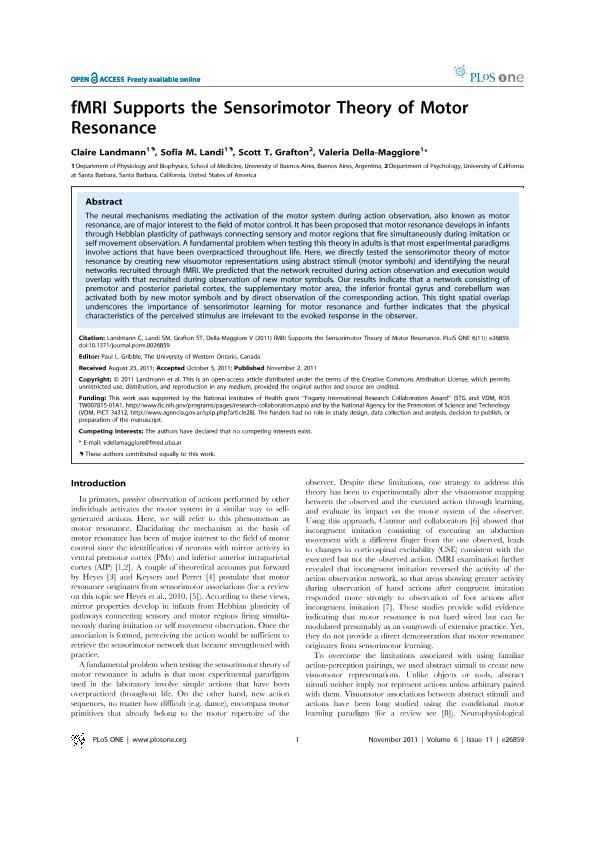Artículo
fMRI supports the sensorimotor theory of motor resonance
Fecha de publicación:
11/2011
Editorial:
Public Library of Science
Revista:
Plos One
ISSN:
1932-6203
Idioma:
Inglés
Tipo de recurso:
Artículo publicado
Clasificación temática:
Resumen
The neural mechanisms mediating the activation of the motor system during action observation, also known as motor resonance, are of major interest to the field of motor control. It has been proposed that motor resonance develops in infants through Hebbian plasticity of pathways connecting sensory and motor regions that fire simultaneously during imitation or self movement observation. A fundamental problem when testing this theory in adults is that most experimental paradigms involve actions that have been overpracticed throughout life. Here, we directly tested the sensorimotor theory of motor resonance by creating new visuomotor representations using abstract stimuli (motor symbols) and identifying the neural networks recruited through fMRI. We predicted that the network recruited during action observation and execution would overlap with that recruited during observation of new motor symbols. Our results indicate that a network consisting of premotor and posterior parietal cortex, the supplementary motor area, the inferior frontal gyrus and cerebellum was activated both by new motor symbols and by direct observation of the corresponding action. This tight spatial overlap underscores the importance of sensorimotor learning for motor resonance and further indicates that the physical characteristics of the perceived stimulus are irrelevant to the evoked response in the observer.
Archivos asociados
Licencia
Identificadores
Colecciones
Articulos(IFIBIO HOUSSAY)
Articulos de INSTITUTO DE FISIOLOGIA Y BIOFISICA BERNARDO HOUSSAY
Articulos de INSTITUTO DE FISIOLOGIA Y BIOFISICA BERNARDO HOUSSAY
Articulos(OCA HOUSSAY)
Articulos de OFICINA DE COORDINACION ADMINISTRATIVA HOUSSAY
Articulos de OFICINA DE COORDINACION ADMINISTRATIVA HOUSSAY
Citación
Landmann, Claire; Landi, Sofía Mariana; Grafton, Scott T.; Della Maggiore, Valeria Monica; fMRI supports the sensorimotor theory of motor resonance; Public Library of Science; Plos One; 6; 11; 11-2011; 1-8, e26859
Compartir
Altmétricas




